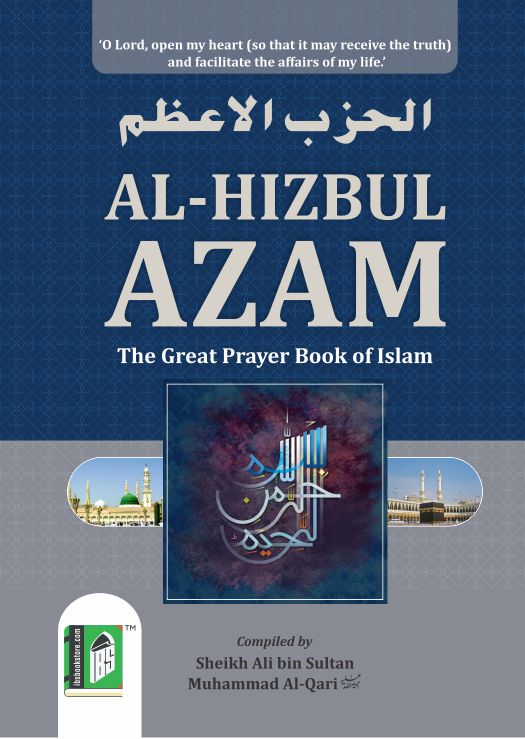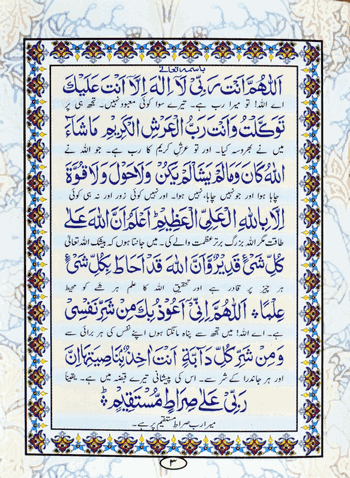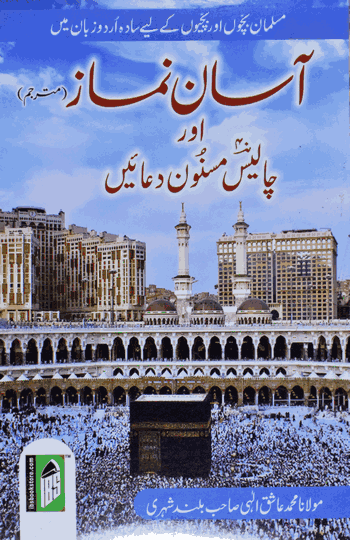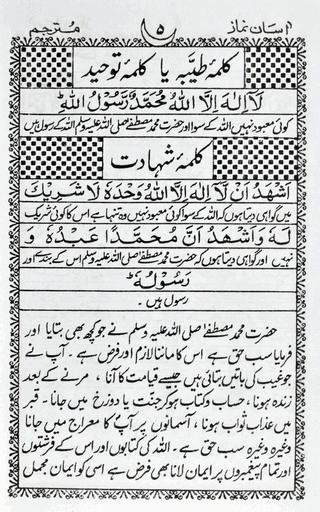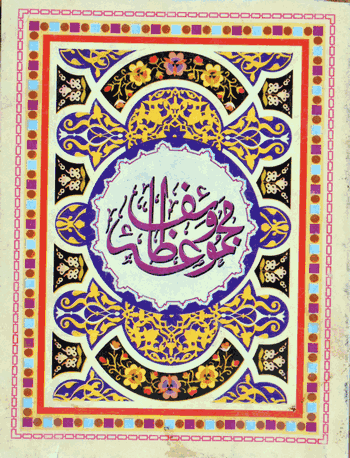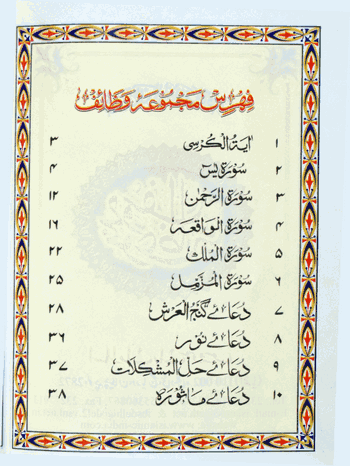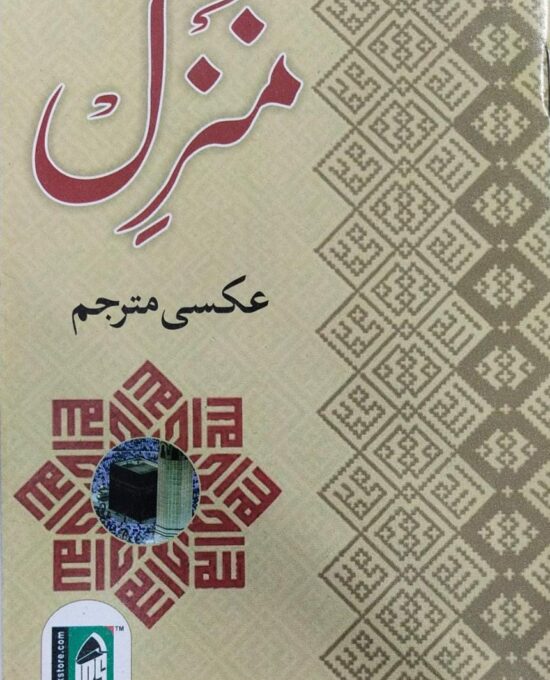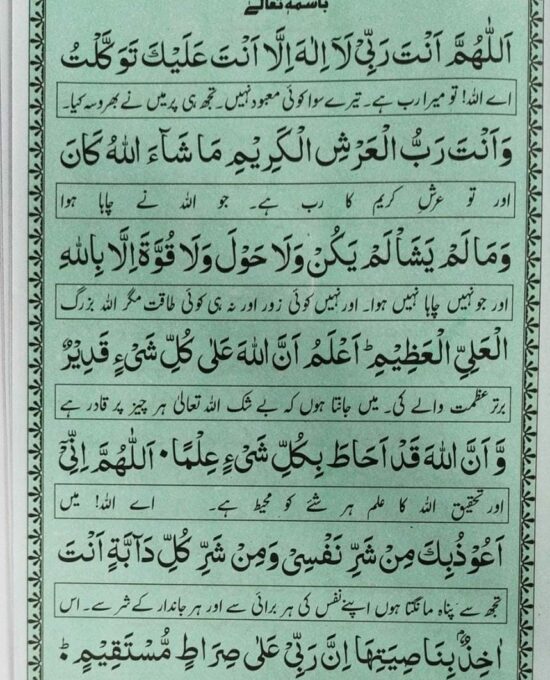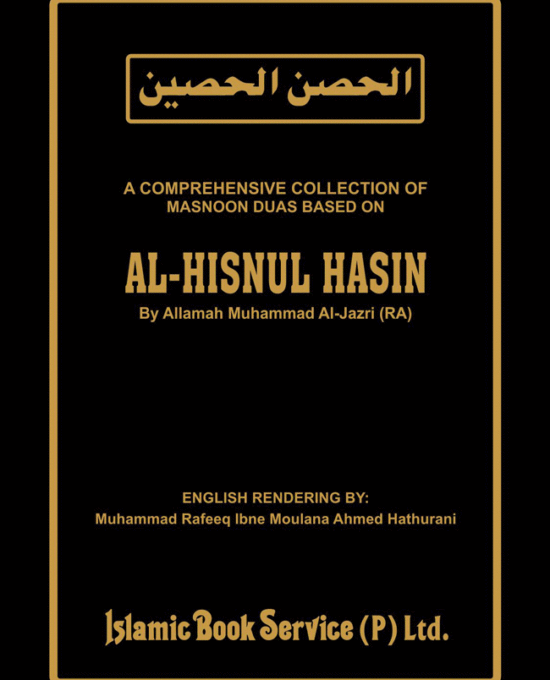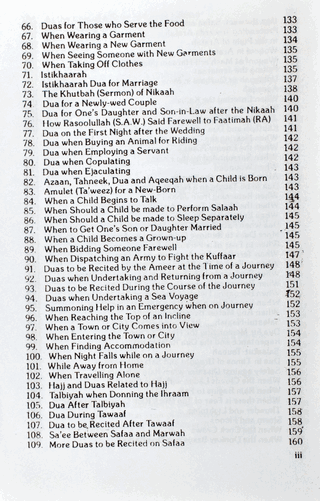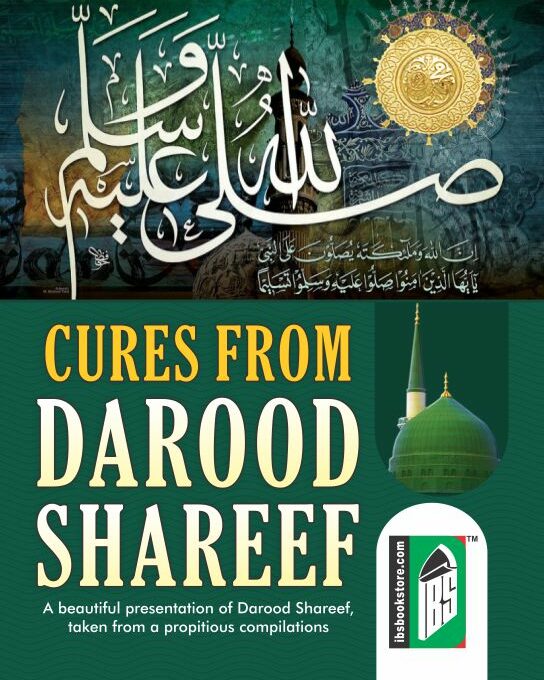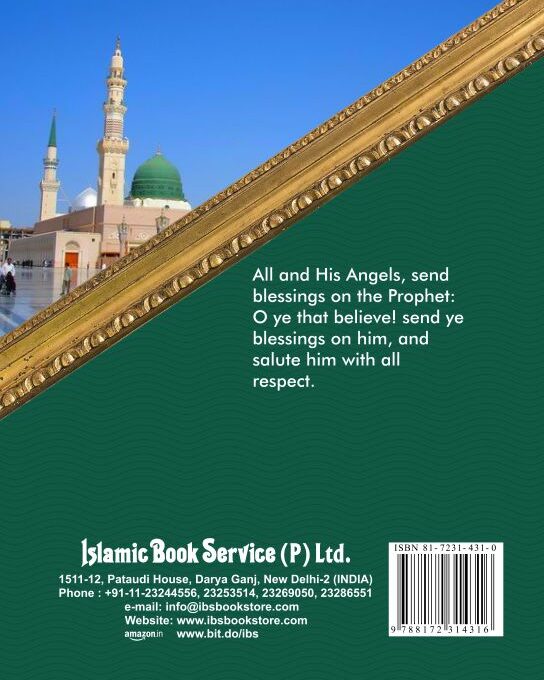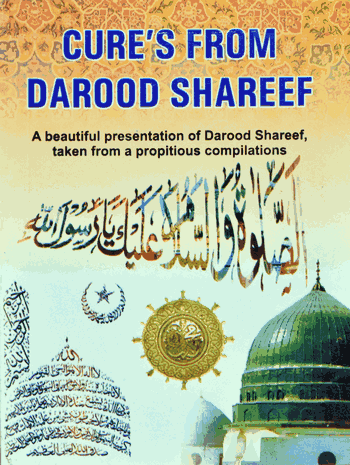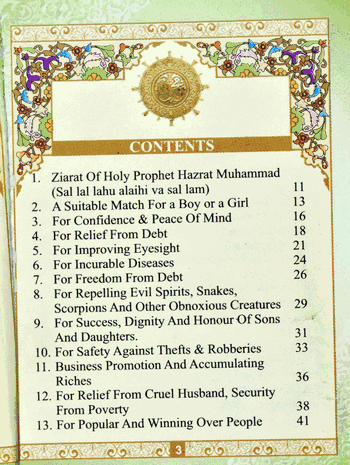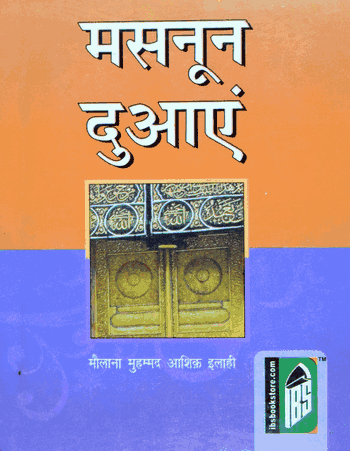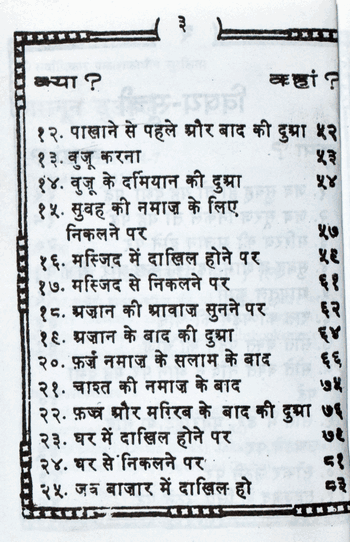Al-Hizbul Azam – (English/Arabic) – (PB)
₹80.00
“Introductory Notes and Comments on Prayers
Mulla Ali Qari a reputed Muslim theologian, caught the idea of collecting all the prayers which are contained in Holy Qur’an and authentic traditions and compiling them into a prayer-book for purposes of recitation. This work was completed more than three centuries back and earned great popularity in the Muslim world, particularly the Indian sub-continent where it almost became part of the daily ritual for all pious persons. The compiler had divided the collection into seven parts, one for each day of the week, in order to facilitate regular recitation by persons who desired to earn the blessing of praying to Allah in terms prescribed by Allah and his Apostle (p.b.h.).
The task of translating the Arabic text of the prayer-book into Urdu with aCCuracy and also incorporating marginal notes indicative of the book of traditions from which a particular prayer or parts of prayer were taken, fell to the lot of another famous divine, the late Qutb-ul-Arfeen Hazrat Moulana Muhammad Badr-e-Alm Madani. The inquiry about the sources of these prayers besides Holy Qur’an was an uphill task and entailed considerable labour. Be that as it may, what we are concerned with is that the translation and marginal notes prepared by the learned translator are considered to be of standard quality and this is why the same have been adopted verbatim by most publishers in Pakistan and India including the Taj Co. Ltd., of Karachi. The Urdu production of the late Moulana was so well received by the Muslim people at large that it gave a new impetus to the circulation of the original text itself in Asia and Africa and it also gave rise to translations in other languages such as Gujrati, etc. In the English rendering of the text made by me on the insistent suggestion of certain friends I have gained the main inspiration as well as the know-how of the work from the Urdu translation and I thus reasonably hope that the present publication will fulfil a much-needed want in all areas of the world where English is the prevailing medium of instruction.
Half of part I of the prayer-book exclusively comprises prayers contained in the Holy Qur’an along with goodly names of Allah (Asma-e-Husna) and naturally the very first Surah thereof, viz.,Alhamd Sharif which is a model of a complete Prayer in itself, appears at the outset of this series. The remaining half of Part I and Part II to VI are prayers which have been collected from authentic traditions of our Holy Prophet (PBUH) and may be reasonably supposed to represent his own sacred utterances. In fact, a considerate and careful study of these prayers must be sufficient to convince an honest reader or scholar that such utterances could only have proceeded from the blessed tongue of the greatest Prophet (PBUH) who under the very minor heading of prayer alone appears to stand unrivalled on the one hand for his unfathomable passion for the welfare of fellow human beings in both the worlds and, on the other, for his display of a perfect vision of Allah’s attributes and manner of reaction to the doings of men. Part VII of the book is exclusively made up of Darood Sharif or formulae for our greeting the Holy Prophet (PBUH) in the form of prayers for grant of mercy to and exaltation of the Holy Prophet (PBUH), his descendants and companions. This is just a way of rendering our grateful homage to the Holy Prophet (PBUH) and his immediate supporters in memory of their marvellous dedication of whole lives to spreading Islam under enormous difficulties without the least desire for recompense from any mortal being while we repeatedly affirm the unity and absolute rulership of Allah and the fact that the Holy Prophet (PBUH) in spite of all his benefaction is no more than a servant and creature of Allah, albeit the best of His creation. Moreover, intent recitation of Darood Sharif never fails to promote in us an attachment of love with the Holy Prophet (PBUH) and his example and thus becomes instrumental in making us true Muslims in word and deed. It is necessary to point out that most of the formulae contained in Part VII have been devised by the companions of Holy Prophet (PBUH) or their associates but at any rate they are the product of either of the three generations which have been spoken of as trustworthy by the Holy Prophet (PBUH) himself. Hence the purposeof reciting Darood Sharif in authentic forms is very well served by using Part VII of the book and most of the latter day prominent saints and divines are known to have resorted to it with perfect confidence as an act of devotion. It should not be supposed for a moment that the prayers formulated by our Holy Prophet (PBUH) are mere effusions of pious sentiments or that a series of blessings have merely been asked for at random. In fact they are much more than that. No doubt their chief function is to teach us the best possible manner of supplicating the Lord with due regard to His attributes and our own weaknesses and thus persuading Him to grant fulfillment of our aims. Along with it they give us the basic doctrines of faith and present detailed knowledge of sins and evils which we have got to avoid in order to achieve happiness in this world and hereafter. We are told that the greatest blessing to be asked for is forgiveness of sins because existence of sins not only leads to evil reckoning in the Hereafter but deprives man of many other favours by the Lord in both the worlds. This is why we find that there are numerous instances of single prayers, each comprising a series of blessings, which either begin or end with a fervent request for forgiveness of sins. The negative factor is thus sought to be eliminated so that positive blessings may be easily gained.
The very first glance at the prayers reveals that they are not meant for hermits or ascetics who intend to renounce the world but are mainly devised to enlighten and encourage a believing soldier who has already made a leap into the thick of battle of life with a determination to win honour and grace in the two spheres of temporal and spiritual existence. His happiness in this life is as dear to Allah as in the Hereafter but there are stern moral laws and principles aCCording to which the Lord behaves towards His creatures and a true seeker of happiness must learn the same and pay due attention to them in his practical life. This is very well borne out from a large number of prayers wherein Allah’s protection is sought from wordly misfortunes and moral degeneration in the same context. Let us, for example, read the following short prayers out of numerous ones of a similar type:
(1) ‘O Allah, I seek Thy protection from anxiety and sorrow, from inaction and laziness, from cowardice and niggardliness and from heavy debt and oppression of men’.
(2) ‘O Lord, I seek Thy help that I may be saved from indolence and evil old age’.
(3) ‘O Allah, I seek Thy protection from indolence, timidity, evil old age, having to defray undue penalty and sinfulness’.
(4) ‘O Allah I seek Thy protection from callousness, negligent habits, extreme poverty, disgrace and destitution’.
It should be remembered that in the above quoted prayers we are supplicating an All-powerful Lord who can award any gift He likes unconditionally, but even on such oCCasions we are constantly being warned to look within ourselves, if there are difficulties without. The reason is that under normal circumstances the moral law works in a palpable chain of cause .and effect hence we must make our own contribution by trying to improve ourselves and may also beseech the Lord for favouring us with causes as in the undermentioned prayer:
‘O Allah I do seek all causes of the grant of Thy mercy and forgiveness and I do seek thorough escape from sin, a full share of virtuous deeds and complete safety from iniquity’.
In a series of prayers our Holy Prophet (p.b.h.) has presented various aspects of happiness in life each of which is a complete picture in itself and the ingredients of each aspect have been analysed and laid down. I regret to avoid too many details which would not fit in within the brief compass of the present notes, trusting that thoughtful readers will be able to realise the truth of my comment when reciting the contents of the prayer-book but all the said prayers invariably teach us that moral elevation is of essential importance. However, if the more fortunate persons among us are able to feel that they have achieved any one or more aspects of happiness as conceived by our Holy Prophet (PBUH) then there are prayers which draw their attention to still newer vistas of progress in the realm of knowledge.
For instance the following one:
‘O Lord, grant me further knowledge and wisdom and join me with righteous persons’.
That is to say, the knowledge to be acquired should be one which leads not only to material gains but also to spiritual gains of a high order. But the quest for knowledge does not end here. A good beginner should rise much higher than that and try to change the very medium of achieving knowledge altogether. A stage comes when he travels on this path in the domain of absolute knowledge and gets into contact with the personal light of Allah which in its turn illumines his entire existence including close environments and there it can be caught even with the naked eye by others. It is such a state of perfection, a visible reality, to which our attention has been drawn in the prayers quoted below:
(1) ‘O Allah, pour Thy light into my heart, my eyes, my ears and shed it on my right, left, behind, in my front, beneath me and overhead.’
(2) ‘O Allah, bestow Thy light on me in my muscles, flesh, blood, hair, skin, tongue and soul, grant it to me profusely and make me all light from head to foot.’
There is a stream of latent knowledge flowing in these prayers, some of them being apparently short, by way of coherence of meaning and purpose between the suCCessive phrases of a single prayer. While I give below one or two examples of this knowledge as it has dawned upon me I feel sure that intelligent readers who mean to continue the search in this direction will find their labour amply rewarded in the shape of thought-provoking discoveries. Let us for this purpose read the following brief prayers:-
(1) ‘O Allah, guard (the chastity of) my private parts and make my work easy,’ (1.e., facilitate the affairs of my life).
(2) ‘O L .old, open my heart (so that it may receive the truth) and facilitate the affairs of my life.’
In the first quoted prayer two separate blessings of sexual chastity and facility in the affairs of life have been bracketed within a single short prayer. Is this combination merely by chance or is there any meaning behind it? The fact is that we are being told that sexual offences and acts of obscenity may under an appointed law lead to a divine reaction in the shape of difficulties and complications in the affairs of life; hence it is most appropriate to pray for both blessings together. Similarly in the second prayer the gift of easy affairs has been connected with the opening of heart for guidance. On mature consideration an interesting coherence of purpose between the two blessings is revealed, in that, the person who is gifted with facility his affairs obtains a first hand experience of the helping hand of Allah on crucial oCCasions and in this way he develops a vision of the benign attributes of Allah which in turn contributes to the opening of heart for guidance Here too a logical affinity between the blessings is thus brought out. It follows that a habitual perpetrator of sexual sins may find himself landed in difficulties and thus deprives himself of possible chances of receiving guidance through the easy process of personal experience.
Our readers will not fail to notice that while a large number of blessings have been named and begged for any suggestion as to time-limit has been scrupulously avoided, not even so much that a particular blessing be granted speedily. The reason is that the right time for a right thing is known to Allah alone and fixation of time must be left to His will. In fact, it is considered unwise and even impudent for a faithful servant of Allah to introduce the time factor in his prayers. But our Holy Prophet (PBUH) out of a tender regard for the weakness of human beings appears to have interceded with the Lord and secured His permission for humbly insisting on the speedy grant of two favours by Him and these are the only two exceptions to the general rule which has throughout been observed in the formulation of prayers. These exceptions are contained in the opening parts of two separate prayers as under: ‘
(1) ‘O Allah, I beg of Thee aCCelerated grant of peace’.
(2) ‘O Allah, I beg of Thee aCCelerated prosperity.’
It is obvious that a normal human being cannot hold on for long when he is devoid of peace or means to support himself and his family and hence on these two oCCasions, relying on the Author Name(s)ity of one who is a mercy to all the worlds (PBUH), we can beseech the Lord to come to our rescue rather hastily.
Before closing my notes I cannot omit to express my gratitude to Moulana Sayed Aftab Ahmed, the son of late Hazrat-ul-Allama Moulana Muhammad Badr-e-Alam Madani, whose considered suggestions and encouragement have throughout been helpful to me in my present effort. Our thanks are also due to Mr Ahmed Yaqoob Laher of Johannesburg who broached the idea of undertaking the English translation and arranged the publication thereof. I, however, feel that while ending my commentary on prayers mere gratefulness will not be sufficient so I pray that both these gentlemen and all other supporters and sympathisers of the move may be vouchsafed that rare happiness in life which has been stated in a fascinating prayer by our Holy Prophet (PBUH) as follows:
‘O Allah, make me self-contented with knowledge, embellish me with forbearance, dignify me with piety and beautify ICC with (the effects of) peace and comfort. “”Ameen””
(Sayed Aqeel Mohammad)
B.Sc.,LL.B.
Madina 13th May 1968
“
10 in stock
This book compiles all the prayers which are contained in Holy Quran and authentic traditions compiling them for different purposes of recitation. The compiler had divided the collection into seven parts, one for each day of the week.
Additional information
| Weight | 0.18 kg |
|---|---|
| Dimensions | 18 × 12.2 × 1 cm |
| Author Name / Translator | Allama Ali Al-Qari |
| Published by | Islamic Book Service P. Ltd – India |
| ISBN | 9788172313494, 9788172313497 |
| Binding Type | Paper Back |
| Publication Year | 2001 |
| Weight (kg) | 0.15 |
| Pages | 1-69+11 |
| Dimensions | 18 cm x 12 cm |
| Length (cm) | 18 |
| Width (cm) | 12.2 |
| Height (cm) | 1 |
| Printing Colour | 1Col. |
| Book Language(s) | English |

